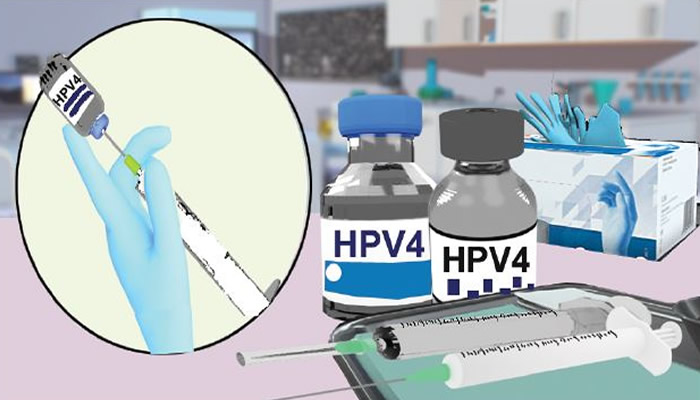
The Human Papillomavirus is one of the most common sexually transmitted infections, which according to the United States’ Centres for Disease Control and Prevention, has resulted in about 43 million infections in 2018, among many people in their late teens and early 20s.
Data from the World Health Organisation indicated that a large majority of cervical cancer (more than 95 per cent) is due to HPV which is the most common viral infection of the reproductive tract. The fact sheet noted that most sexually active women and men would be infected at some point in their lives, and some may be repeatedly infected.
The highest prevalence of cervical HPV among women is in sub-Saharan Africa (24 per cent), followed by Latin America and the Caribbean (16 per cent), Eastern Europe (14 per cent), and South-East Asia (14 per cent).
In Nigeria, cervical cancer is the third most common cancer and the second most frequent cause of cancer deaths among women aged between 15 and 44 years. In 2020, there were no fewer than 12,000 new cases and 8,000 deaths from cervical cancer.
The WHO added, “Prevalence in men highly varies, based on sexual trends. Evidence showed that the prevalence of the virus is higher among women living with HIV, men who have sex with men, immune-compromised individuals, people with co-infection with other sexually transmitted infections, people who receive immunosuppressive medications and children who have been through sexual abuse.
“Globally, it is estimated that 625,600 women and 69,400 men get HPV-related cancer each year. Cervical cancer was the fourth leading cause of cancer and cancer deaths in women in 2020, with an estimated 604,127 new cases and 341,831 deaths worldwide. Cervical cancers account for 93 per cent of HPV-related cancers in women.”
It was estimated that in most cases (nine out of 10), HPV goes away on its own within two years without health problems. But when HPV does not go away, it can lead to health problems like genital warts and cancer. These genital warts usually appear as a small bump or group of bumps in the genital area. They could be small or large, raised or flat, or shaped like a cauliflower.
The most effective way to stop these health problems is the use of HPV vaccines. To this end, on October 24, the Federal Government introduced the HPV vaccine into the routine immunisation system. The vaccination targets over seven million girls, which is the largest number in a single round of HPV vaccination in the African region.
The HPV vaccine is being provided for free by the Federal Ministry of Health and Social Welfare through the National Primary Health Care Development Agency with support from Gavi, the Vaccine Alliance, the United Nations Children’s Fund, the WHO and other partners.
Girls aged nine to 14 years will receive a single dose of the vaccine, which is highly efficacious in preventing infection with HPV types 16 and 18 that are known to cause at least 70 per cent of cervical cancers. The five-day mass vaccination campaign in schools and communities will be carried out during the inaugural rollout in 16 states and the Federal Capital Territory.
After this, the vaccine would be incorporated into routine immunisation schedules within health facilities. The second phase of the vaccination introduction is scheduled to begin in May 2024 in 21 states.
Vaccine hesitancy
Unfortunately, in spite of the efforts to combat the spread of HPV through the vaccine and debunk misinformation, there have been conspiracy theories against vaccination.
The host of a family programme in Abuja had in a video that later went viral claimed that the HPV vaccine was harmful to girls and was targeted at reducing the population of Nigerians.
There have been several other claims by parents, leaders and other persons that people should be wary of vaccines. The vaccine hesitancy in Nigeria manifested in some other vaccines, including the Covid-19 vaccine.
Regarding reports of its side effects, the CDC fact sheet acknowledges HPV vaccines can cause minor side effects such as fainting, nausea and headache, but the agency adds that the vaccine does not cause fertility problems as reported on anti-vaxx platforms.
Medical experts respond
Speaking with Sunday PUNCH, the Chief Executive Officer, Lifeboxlabs, Dr Olusina Ajidahun, warned against believing anti-vaccine theories, which he emphasised could further endanger public health.
He said, “Political influencers and anti-vaccine handles are pushing a narrative that the government wants to harm our girls. This is a big lie and people shouldn’t listen to them. These people don’t understand how vaccines work but are just interested in pushing an agenda that’s dead on arrival. This agenda, if allowed to thrive, would be deadly to the health and well-being of millions of Nigerians.
“Yes we are all critics of the state of the Nigerian government but that doesn’t mean when something good is done we should not praise them and give them their flowers. HPV vaccines have been scarce globally, and this move by the government is one many countries will die for.
“How exactly do vaccines work? When vaccines are introduced into the body, they trigger the body to make antibodies which help fight infections when the real disease or organism comes. You technically don’t have the disease but are protected from disease occurrence in the future.”
Ajidahun explained that vaccines are like drugs and can produce reactions in individuals, which could vary from fever to body pain, but that this does not justify the hesitancy towards the HPV vaccine. He added that pregnant women were exempted from the HPV vaccine.
He added, “A lot of these political influencers are quoting over the Merck HPV scandal. There is no evidence to suggest that the HPV vaccine will destroy the ovaries or cause full-blown cancer in women who take it. A few research flaws in the article. The Gardasil that was referenced is taken in some countries and the lawsuits are ongoing but the evidence is still poor. These are just vaccine lawyers who don’t understand immunity and will lose the case going forward.
“Please don’t deprive your children of this HPV vaccine. This vaccine is protecting the future of our young boys and girls against these cancers because both genders can spread the virus and have the respective cancers.”
Also, a clinical pharmacist, Chiamaka Ebirim, in an interview with Sunday PUNCH, cited the 2021 publication of the United States CDC on HPV, noting that 85 per cent of sexually active persons would get HPV infection in their lifetime, if not vaccinated.
Ebirim added, “The importance of HPV vaccination cannot be overemphasised and shouldn’t be overlooked, instead it should be accepted just like other vaccinations like polio vaccination.
“Most HPV infections will go away on their own. There are different strains of HPV but infections that don’t go away can cause certain types of cancer at locations such as the cervix, vagina, and vulva in women; penis in men; anus in both women and men; and the oropharyngeal areas in both men and women.
“Amongst the cancers caused by HPV, only cervical cancer can be detected early with a screening test, other cancers caused by HPV may not be detected until they are more serious, hence the need for vaccination. HPV vaccination provides safe, effective and long-lasting protection. Moreover, early protection works best, hence the need for vaccinating young girls who can contact the infection when they become sexually active; this is even more expedient given the rising cases of rape and sexual abuse reported by young girls.”
He said parents had a responsibility to dispel fake news and fears attributed to HPV vaccination and that they should present their children and/or wards for vaccination.
Ebirim also pointed out that “as with other vaccines, there could be pain, swelling, redness at the injection site, etc. However, these discomforting effects will fade away in a day or two. Claims of fertility problems associated with vaccination have not been backed with any credible evidence.”
A public health physician and founder of Quinta Health, Dr Adewumi Babatunde, in a video shared on X, said, “I am begging you not to allow wicked people spoil the future of your girls. There is a vaccine that is being rolled out by the government now, and that is the HPV.
“This vaccine is very safe and effective. It prevents women from having cervical cancer. Every two seconds, one woman dies from cervical cancer, and if they had been vaccinated against this HPV, they wouldn’t have these issues. Allow your girls to take this vaccine and secure their future.”
The wife of the Lagos State Governor, Dr Ibijoke Sanwo-Olu, decried the misinformation and misleading narratives about immunisation being promoted by some persons.
She stated, “Extensive research and rigorous testing have been conducted to ensure the safety and efficacy of this HPV vaccine with the approval of relevant regulatory bodies and reputable health organisations worldwide.
“Let us dispel the wrong notion surrounding the HPV vaccine and embrace the opportunity it presents to prevent HPV-related diseases. It is the duty of everybody to be vocal about the importance of this vaccination by ensuring that everyone within our sphere of influence partakes in the exercise.”





